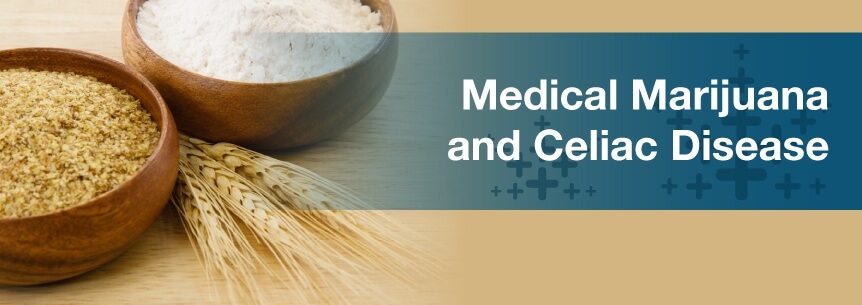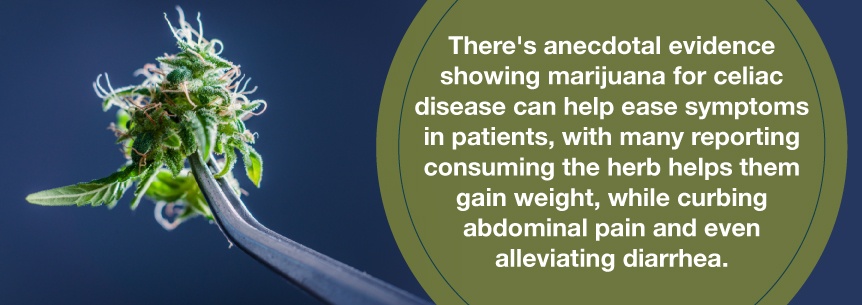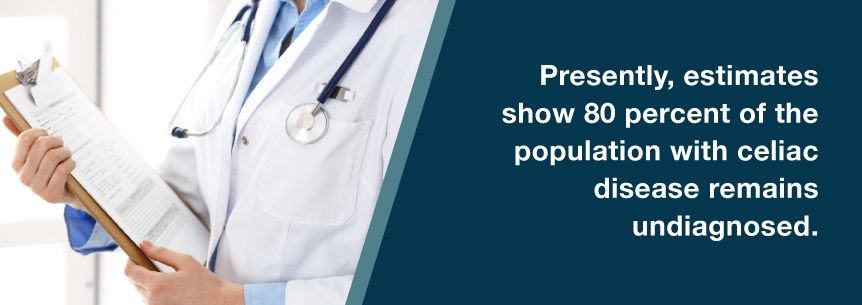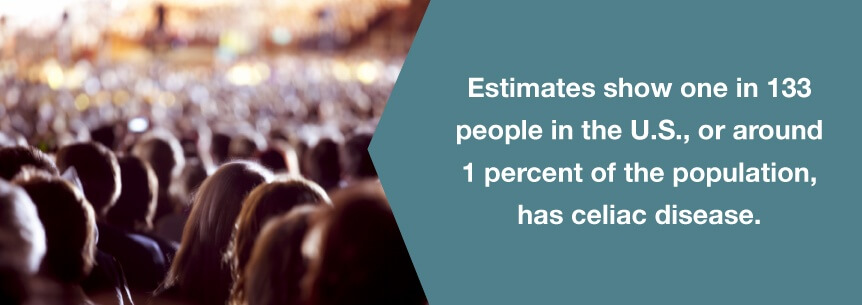
Celiac disease is a type of autoimmune disorder — a severe condition that may occur in genetically predisposed individuals for whom gluten ingestion results in small intestine damage. Estimates show celiac disease affects one in 100 individuals worldwide, according to the Celiac Disease Foundation. In the U.S., 2.5 million people are undiagnosed and have a higher risk of long-term health complications. Symptoms of celiac disease can be unpleasant. Fortunately, medical marijuana for celiac disease can help.
Studies show cannabinoid receptors can help heal intestinal lining damage in people with celiac disease. Therefore, researchers suggest targeting CB2 receptors in individuals who suffer from celiac disease. Many individuals have experienced relief from their stomach pain, and in some cases have even reported being disease-free after using medical marijuana for celiac disease.
While there’s no suggestion medical cannabis can cure the condition, and a gluten-free diet is currently the only treatment option available for celiac disease, it’s possible cannabis may have a positive impact on some celiac symptoms.
For instance, it’s common for celiac disease patients to experience abdominal pain. Excess gas and bloating are often the cause of this pain and occur in both individuals with undiagnosed celiac disease and those who have received a diagnosis and are following a gluten-free diet.
Patients use medical weed often for treating chronic pain, and many have explored it as a potential treatment for irritable bowel syndrome. Researchers have also found good evidence medical pot can treat nerve pain at low doses.
Find A Doctor Find A Dispensary
Some symptoms medical cannabis for celiac disease can treat include:
Symptoms of celiac disease often include abdominal pain, which can sometimes be severe, including nausea. Some evidence shows cannabis can combat both nausea and pain in other conditions.
There’s anecdotal evidence showing marijuana for celiac disease can help ease symptoms in patients, with many reporting consuming the herb helps them gain weight, while curbing abdominal pain and even alleviating diarrhea.

Nausea, while not as common as other symptoms of the condition, is a side effect for some patients, especially when they have consumed a large amount of gluten. Cancer patients commonly use cannabis to alleviate nausea, and those experiencing nausea due to chemotherapy and other conditions state the herb is often helpful.
A lot of individuals with celiac disease, when first diagnosed, are underweight. As you may have heard, marijuana creates “the munchies,” and therefore it’s quite possible consuming medical weed could help these individuals gain their weight back.
The depression and anxiety linked with this condition are also symptoms marijuana can help with.
You can experience side effects with all drugs, and cannabis for celiac disease is no exception. Some side effects associated with marijuana use include:
Many cannabis doctors suggest Indica strains to treat symptoms of celiac disease. Indica helps slow down muscle contractions, relaxes the muscles, makes digestion easier and eases stomach pain.
Some effective medical marijuana and celiac disease strains include:
Using CBD can help celiac disease patients gain back their appetite and gain weight, because the anti-emetic and anti-inflammatory effect of CBD allows users’ bodies to absorb food nutrients better, reversing the symptoms described previously.
While there are various ways to obtain your CBD, the most recommended and common is with CBD oil. Using it sublingually will allow the CBD to reach your bloodstream faster, and your intestinal tract acids won’t degrade it. That maximizes CBD’s anti-inflammatory properties, enabling the patient to obtain the essential nutrients they require for a balanced diet without the common discomforts.
Other methods of medical marijuana for celiac disease use include:
You don’t have to struggle with your symptoms of celiac disease anymore. With more states legalizing medical marijuana, you’ll find a lot more dispensaries opening their doors to help fulfill your cannabis needs. But, since there are so many dispensaries, how do you know which one is best?
Here at Marijuana Doctors, our cannabis doctors are specially trained and qualified to help you through your entire medical cannabis treatment journey. Book an appointment today and let us connect you with one of our doctors to help get you started.
Find A Doctor Find A Dispensary
Celiac disease, also known as gluten-sensitive enteropathy, coeliac or sprue, is an immune reaction to consuming gluten, a protein in barley, wheat and rye.
In people with celiac disease, eating foods that contain gluten triggers an immune response in their small intestine. This reaction, over time, damages the lining of their small intestines and prevents nutrient absorption. Intestinal damage can result, and you can feel tired and weak. It can also lead to severe complications.
Nutrient malabsorption can affect children’s development and growth, along with the symptoms you see in adults.
Celiac disease doesn’t have a cure, but for most patients, adhering to a strict gluten-free diet helps them promote intestinal healing and manage their symptoms.
Celiac disease is not the same as a food allergy, and the symptoms you experience will differ. For instance, if you have wheat allergies, you might have watery or itchy eyes or have a difficult time breathing after consuming something that contains wheat.
In contrast, if you have celiac disease and you accidentally consume something containing gluten, you might experience intestinal issues like constipation, diarrhea or gas, or you may experience some of the following symptoms:
In kids, intestinal issues are a lot more common than they are in adults. Symptoms in children may include:
Not everybody with the condition will experience these symptoms. Some may have no issues at all, making diagnosis difficult.
An interaction between gluten, genes and other environmental factors leads to celiac disease. However, medical professionals have yet to determine the exact cause. Gastrointestinal infections, infant feeding practices and gut bacteria could contribute to celiac disease development.

In some cases, celiac disease becomes triggered or active for the first time after:
When your immune system overreacts to food with gluten, this reaction can damage the minuscule projections similar to hair that line your small intestine. These projections, which are called villi, absorb vitamins, minerals and other food nutrients you consume. If you have damaged villi, no matter how much you eat, you can’t obtain enough nutrients.
Certain gene variations seem to raise the risk of developing celiac disease. However, having these gene variants doesn’t necessarily mean you’re going to get the disease, which suggests other factors must be involved.
Risk factors of developing celiac disease include:
There are two main types of celiac disease: classical and non-classical.
With this type, individuals have symptoms and signs of malabsorption, which include:
With this type, individuals might experience mild gastrointestinal symptoms without obvious signs of malabsorption, or might have unrelated symptoms. They might suffer from abdominal pain and distension and other symptoms like:
The many ways celiac disease may impact individuals, along with the lack of primary care residency programs and training in medical schools, both contribute to a poor diagnosis in the U.S. Presently, estimates show 80 percent of the population with celiac disease remains undiagnosed.

You can develop celiac disease at any age after you’ve started eating foods or taking medications containing gluten. Celiac disease can lead to other severe health issues if left untreated, including:
Celiac disease in children can also lead to:
Individuals with untreated celiac disease can also suffer from a wide range of psychological issues. They may have difficulty adjusting to a new chronic illness diagnosis or trouble dealing with gluten-free diet adherence. Greater severity of symptoms, behavioral or emotional symptoms or significant impairment in function are all signs of the potential need for mental health treatment. These may include:
Depression and other related mood conditions are also common among people with celiac disease and gluten sensitivity. One study published in Psychiatry Quarterly found dysthymic disorder, major depressive disorder and adjustment disorders occurred more often in a group of patients with celiac disease, compared to controls. A subsequent study supported increased dysthymia prevalence in celiac disease, compared to controls.
Another study showed individuals with celiac disease have a higher chance of receiving a subsequent depression diagnosis, but not bipolar disorder, as opposed to individuals without celiac disease.
Beyond Celiac offers these estimates about the condition:

Around 8,000 years after the first reported case of the illness, medical professions gave celiac disease its name. Living in the first century CE, Aretaeus of Cappadocia, a Greek physician, wrote about “the coeliac affection.” He gave it the name “koiliakos” after the Greek word for “abdomen,” which is “koelia.”
In the early 19th century, Dr. Mathew Baillie — who was likely unaware of Aretaeus — reported his observations of adults with a chronic diarrheal disorder causing malnutrition and a gas-distended abdomen. Those people seemed to benefit significantly from living nearly entirely on rice, according to Baillie’s observations, but his report went almost unnoticed.
Seventy-five years later, Dr. Samuel Gee, a top British authority in pediatric diseases, took full credit for celiac disease’s modern description when giving a lecture on the “celiac affection” to medical students — now the disorder’s milestone description.
A lifelong, strict gluten-free diet is currently the only treatment for celiac disease. Along with wheat, other foods containing gluten are:
Your doctor might refer you to a dietitian who will work with you to create a healthy gluten-free diet plan. Once you eliminate gluten from your diet, your small intestinal inflammation typically begins to lessen, generally within a few weeks, although you could start feeling better in a matter of days. Complete villi healing and growth might take a few months to a few years. Small intestine healing seems to happen quicker in children than in adults.
If you are deficient in certain vitamins or minerals, like calcium, iron, folate, zinc, niacin, vitamin D, fiber, vitamin B12 and others, you may require supplements. Besides becoming deficient in some nutrients due to eliminating certain foods from your diet, you typically won’t experience any side effects from treating your celiac disease.
With improving insight into the celiac disease pathogenesis, medical researchers have suggested a few potential drug targets. Newer strategies include: